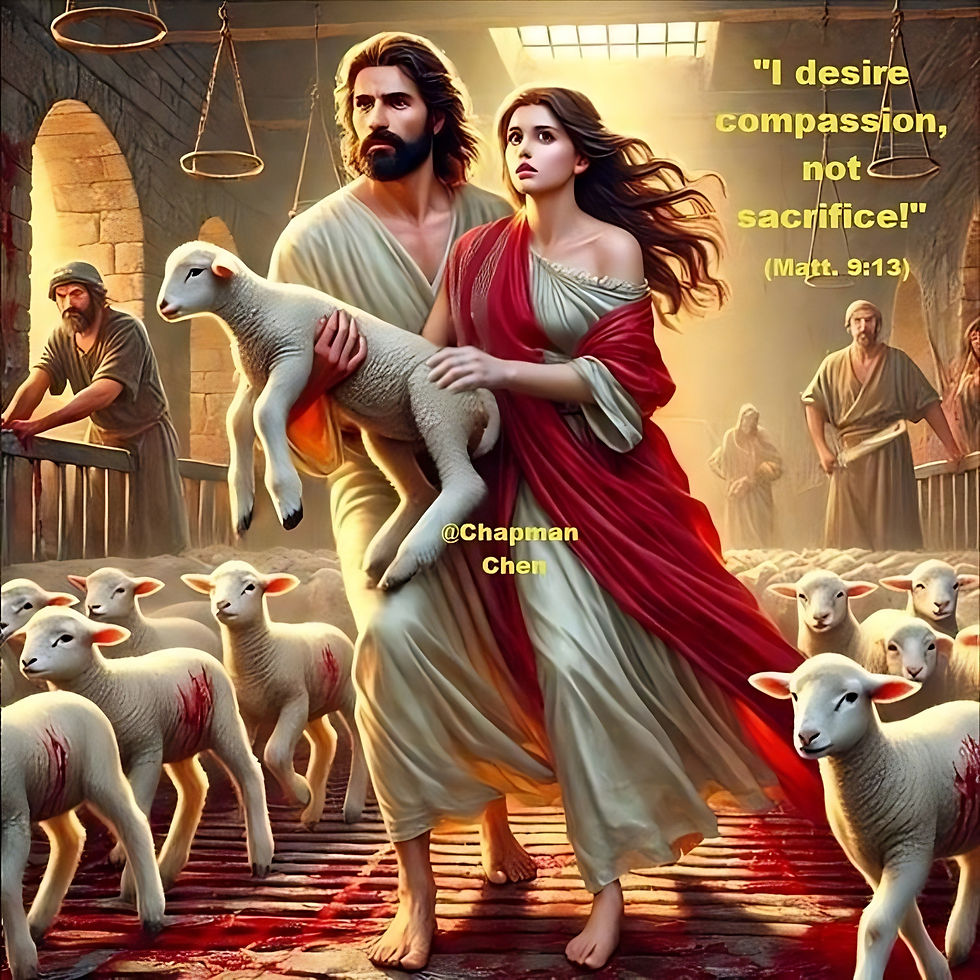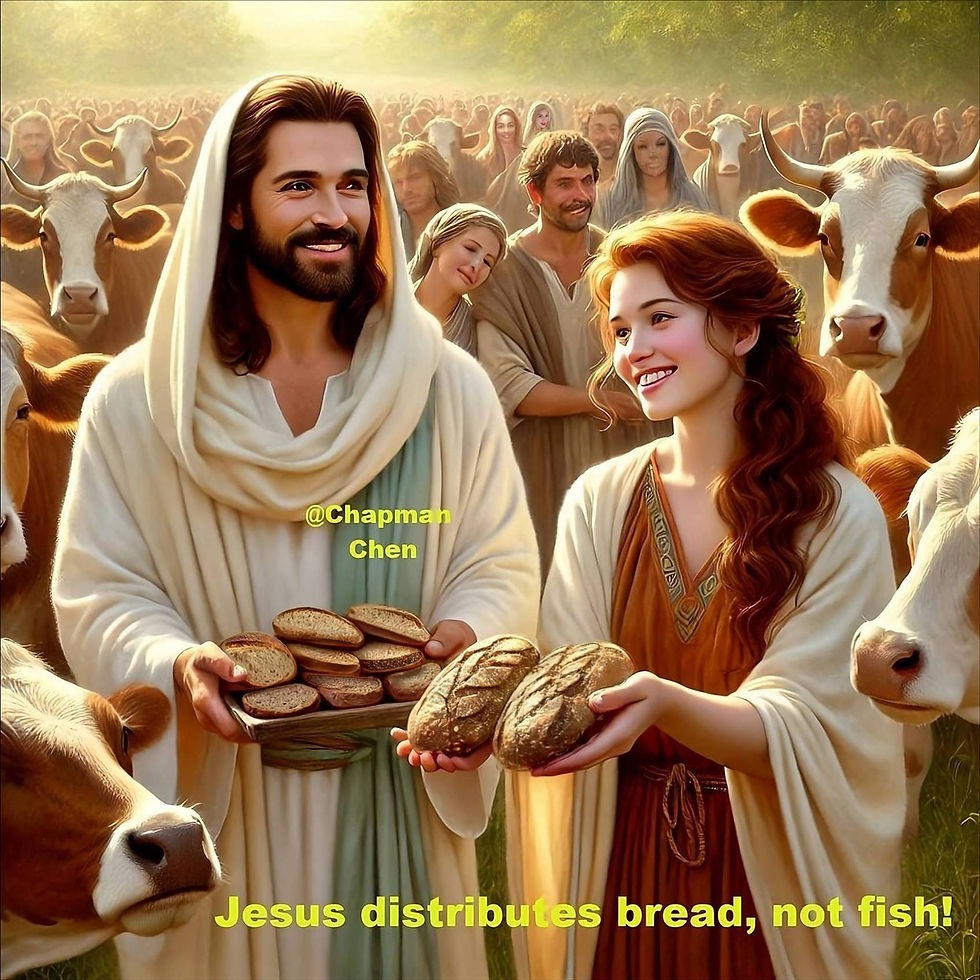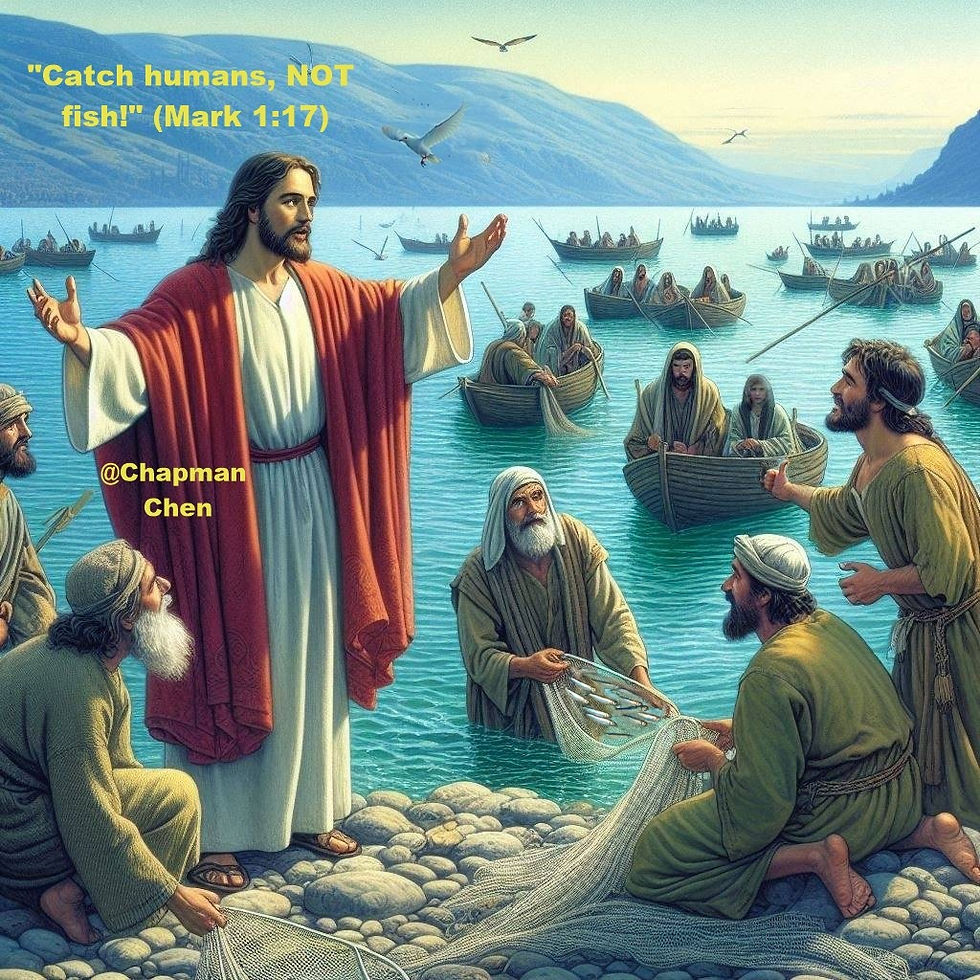All those Fishy Stories about Jesus (Revised). By Dr. Chapman Chen
- Chapman Chen

- Aug 16, 2025
- 15 min read
Updated: Dec 17, 2025

Executive Summary: Instances of Jesus the Vegan Christ eating fish or helping His disciples to catch fish in the gospels are all products of either misinterpretation or later interpolation (cf. Chen 2023, 2022a, 2022b, 2020).
I. Jesus multiplied "five loaves and two fish" to feed the multitudes (Matthew 14:13-21, Mark 6:31-44, Luke 9:12-17, John 6:1-14)? However, Jesus therein broke and handed out loaves but not fish (Matthew 14).
Moreover, the Greek word for fish (ichthys ἰχθύας), as in Mark 6:41, Matthew 14:19, and Luke 9:16, is an acronym for " Jesus Christ, Son of God, Savior" (Akers 2000), a secret code commonly used by the early Christians to avoid persecution; and "fish (opsarion)", as in John 6:9, may also be a mistranslation of the Greek word for "fishweed (opson)" (Hicks 2019; Giron 2013), a popular vegan relish among Palestinian peasants both 2000 years ago and now.
II. Jesus eating fish to prove to the eleven disciples in Jerusalem on the very night of his Resurrection that he's no ghost (Luke 24: 39-43), and His helping Peter and others to catch fish (John 21:1–14) at the Sea of Galilee, when He manifested Himself to the disciples for the third time after resurrection, are clearly forgeries, for both the dates and the venues contradict Mark and Matthew (cf. Vujicic 2016). Jesus had long told his disciples that he would go to Galilee, not Jerusalem, upon resurrection (Mark 16: 7, 14:28). And the 11 disciples met the post-Resurrection Jesus for the first as well as the last time on a mountain in Galilee (Matthew 28:16), where no fish catching or fish eating occurred. The interpolation theory is corroborated by the fact that Luke 24:42–43 is missing in Codex Bezae Cantabrigiensis, a significant 5th-century manuscript of the New Testament (note 1).
III. Jesus miraculously aided Peter and his folk to catch a huge net of fish (Luke 5:1-11)? But Jesus then asked them to FORSAKE their NETS, follow Him and CATCH MEN INSTEAD OF FISH. Matthew 4:18-20 and Mark 1:16-18 also record this story albeit without the first part.
IV. Jesus directed Peter to go hook a fish and dig a coin from her/his mouth in order to pay a temple tax (Matthew 17:24-27)? This could not be real for, firstly, it was never executed; secondly, it's improbable that Jesus would have performed a complex miracle in order to pay his own tax; thirdly, how could Jesus, who died for animal liberation (Akers 2000), have had the heart to order his disciple to do such a cruel thing to an innocent fish?
So, this instruction, if ever existent, was a sarcastic joke cracked by Jesus to brush off the temple tax collector who wanted to trap Jesus. A refusal on His part to pay the tribute would be represented as disloyalty to the temple; while the payment of it would be taken as justifying their denial of Him as a prophet, for prophets were customarily exempted from the temple tax (cf. White 1898/2017:376-377).
Full Text Link: https://www.vegantheology.net/post/all-those-fishy-stories-about-jesus-revised-by-dr-chapman-chen ;
YouTube link: https://www.youtube.com/watch?v=YFN7GeHlVqI
Contrary to mainstream churches' belief, Jesus Christ was vegan. Instances of Jesus eating fish or helping His disciples to catch fish in the gospels are products of either misinterpretation or later interpolation.
1. Jesus Desires Compassion, not Sacrifice
In Matthew 9:13 (NASB), Jesus admonished the Pharisees, “I desire compassion rather than sacrifice”. In Saying 87, the Gospel of Thomas, as translated and edited by Steven Davies (2002), Jesus said, "Wretched is a body depending on a body". Now, how can a body be dependent on another body? Only if the body eats the other body. Hence, Davies (2002) comes to the conclusion that Thomas is not stating that all bodies are "wretched", just bodies which are dependent on other dead bodies, in other words, meat, for food. When Epiphanius questions a Jewish Christian as to why he was a vegan, the Jewish Christian responds simply: "Christ revealed it to me" (Panarion 30.18.9).

Jesus’s natural brother, James the Just, is reported to have been vegan. "Who and whatever James was, so was Jesus." (Eisenman 1997). Jesus cared about sparrows (Matthew 10:29), fowls (Matt. 6:26), lamb (John 13:6), sheep (Matt. 12:11), doves (Matt. 10:16), hens (Matt. 23:37), donkey (Matt. 21:7), mule(s) (Linzey and Dorothy 1998: 38-39 ; Linzey 2010: 60-61), asses and oxen (Luke 14:5), etc.
Jesus even died for animal liberation. In freeing the sacrificial animals from the Second Temple and in calling it “a den of murderers” (Mark 11:16, Luke 20:46, Matt. 21:12-13), Jesus debunked its violent, fraudulent nature, and disrupted the lucrative income stream of the chief priests and scribes, who immediately afterwards plotted to have Him killed (Mark 11:18), eventually leading to His crucifixion (Akers 2000, 113-134).
2. Jesus did not Distribute Fish
In the miracle of "five loaves and two fish," Jesus broke loaves but not fish (Matthew 14). The Greek word for fish (ἰχθύας) was a code word for " Jesus Christ, Son of God, Savior" (Akers 2000); and "fish" may also be a mistranslation of the Greek word for "fishweed" (Hicks 2019; Giron 2013).
2.1. Jesus Broke Loaves but NOT Fish (Matthew 14)
In the miracle of "Five loaves and two fish," which is narrated in Matthew 14:13-21, Mark 6:31-44, Luke 9:12-17, and John 6:1-14, Jesus neither condoned the eating of fish nor gave it to the masses (Matthew 14). As pointed out by John Vujicic (2009), if you carefully read the text of Matthew 14, you will see that Jesus only broke the LOAVES and gave ONLY THE LOAVES to the people. Twelve baskets were filled with the broken pieces of BREAD. Subsequently, when Jesus referred back to the feeding of five thousand and of four thousand in the Gospel of Matthew 16:9-10 and the Gospel of Mark 8:19-20, He merely made reference to the LOAVES of BREAD AND THE BASKETS which held the broken pieces of bread, and never mentioned in any way the fishes (cf. Phelps 2002, 113-114).

Likewise, Irenaes, in his book written in the 2nd century, twice states that Jesus fed the crowd with bread and nothing else (Against Heresies 2.22.3, 2.24.4; see Akers 2020:126). Arnobius narrates the miracle of the feeding of the 5000 in a similar manner, sans referring to fish (Against the Heathen 1, 46). Eusebius, too, talks about this event sans bringing up fish (Proof of the Gospel 3,4).
In John’s version even though reference is circuitously made to Jesus’s breaking of the fishes, the twelve baskets contained only the broken pieces of FIVE LOAVES. Obviously Jesus used only five loaves to feed the crowd and the reference to the fishes is a subsequent interpolation.
2.2. Fish vs Fishweed
As put by Raw Matt (2019), "Even IF the manuscript is correct, the translation is erroneous." The "fish" in the miracle concerned is probably a mistranslation of a kind of dried seaweed. As found by the author's own research, in the Greek version of John 6:9, the word for "fish" is ὀψάριον (opsarion), which according to Thayer's Greek Lexicon (STRONGS NT 3795), is a "diminutive from ὄψον [opson] (cf. Curtius, § 630) i.e. whatever is eaten with bread, especially food boiled or roasted"; and according to Strong's Exhaustive Concordance, is "a relish to other food (as if cooked sauce)…(presumably salted and dried as a condiment)". So opsarion is not necessarily real fish, but may be just a relish (cf. Phelps 2002, 113).
In this vein, after going through hundreds of ancient Greek writings, Ryan Hicks (2019:148) noted opsarion employed in many ways, including directly denoting plant life. For instance, 800 years before Jesus, Homer employed opson, the origin of opsarion, in his epic The Illiad, book 11, section 630, putting down:
"She first drew before the twain a table, fair, with feet of cyanus, and well-polished, and set thereon a basket of bronze, and therewith an onion, a relish [ὄψον, opson] for their drink, and pale honey, and ground meal of sacred barley..."
Hicks (2019:148) argues that "'fish' can refer to any aquatic life, including the fishweed, seaweed, and other aquatic plants that commonly made up the opsarion/relishes.... In Homer's reference it was an onion that made up the bulk of the relish."
Similarly, Giron (2013) points out that "dried fishweed would be more likely in a basket with bread, and fishweed remains a popular food among Palestinian peasants like the people to whom Jesus was speaking."
Moreover, according to Giron (2013), this helps explain Matthew 4:18-20, where Jesus gets his first disciples by telling some fishermen to give up their profession and follow him. Jesus even says to them "I will make you a fisher of men". Could this be Jesus was having them give up their barbaric line of work to do something more righteous? It may sound absurd, but it starts to make a little more sense when you take it in the same context as the story of feeding five thousand, where the disciples never even considered trying to catch some fish, despite being beside the sea. Why didn't they go fishing? Did Jesus teach it was wrong to eat fish?

2.3. Ichthys = Jesus Christ, Son of God, Savior
A noteworthy observation concerning the fish symbol: The Greek word for fish (ἰχθύας/Ichthys) was an acronym or code word for " Ἰησοῦς Χρῑστός Θεοῦ Υἱός Σωτήρ [Jesus Christ, Son of God, Savior]", popular among early Christians for the sake of avoiding persecution (cf. Akers 1989; Regenstein 1991; Altar n.d.). And in the Greek version of Mark 6:41, Matthew 14:19, and Luke 9:16, the word for fish as in "the five loaves and two fish" is none other than ἰχθύας!
3. Jesus Eating Fish after Resurrection is Fake News!

Luke's story of Jesus eating fish to prove to the eleven disciples at evening on the day of his Resurrection that he's no ghost is clearly a forgery, for both the date and the venue contradict Mark and Matthew.
Luke 24: 39-43 and John 21:1-14 are the only places in the New Testament that mention Jesus eating meat. According to Luke, Jesus ate fish (ἰχθύος/Ichthys) in front of 11 disciples in Jerusalem on the first night of his Resurrection: "Behold my hands and my feet, that it is I myself: handle me, and see; for a spirit hath not flesh and bones... And while they yet believed not for joy, and wondered, he said unto them, Have ye here any meat? And they gave him a piece of a broiled fish, and of an honeycomb. And he took it, and did eat before them" (Luke 24: 39-43 KJV).
However, according to the Gospel of Mark 16: 7 and 14:28, Jesus had long told his disciples that he would go to Galilee upon resurrection. According to Mark 16: 9 -19, Jesus revealed himself thrice after resurrection, the first time to Mary Magdalene; the second time to two disciples on the road; the third time to all the 11 disciples, presumably in Galilee. According to Matthew 28:16, the eleven disciples went up a mountain in Galilee as specified by Jesus, where Jesus met them the first time as well as the last time after He rose from the dead. So the Gospel of Luke's claim that Jesus ate fish in front of the disciples in Jerusalem on the very night of his Resurrection is wrong in terms of both date and venue. Apparently, it is fabricated and not to be believed (cf. Vujicic 2016). The same applies to a resurrected Jesus helping His disciples to catch and cook fish at the sea of Tiberius in John 21:1-14. Notably, John 21 is widely regarded by scholars as an appendix or later addition (see Raymond Brown, Rudolf Bultmann, etc.).
3.1. Fishy Story Interpolated to Combat "Heresies"
According to Akers (2000:128), this fishy story was interpolated by Luke (Paul the anti-vegan, self-proclaimed apostle's underling) in order to combat veganism as wells as "the idea of the 'docetic Christ' -- the idea, held by certain Gnostics such as Marcion, that Jesus had no real body," being just a phantom or a ghost. The consumption of fish is a particular demonstration by Yeshua that He is no phantom:- "Touch me and see; a ghost does not have flesh and bones, as you see I have” (Luke 24:39 NIV).
3.2. Luke 24:42–43 Missing in Codex Bezae
The interpolation theory is corroborated by the fact that Luke 24:42–43 is missing in some of the oldest manuscripts, including Codex Bezae (D). Codex Bezae Cantabrigiensis is a significant 5th-century manuscript of the New Testament, notable for its distinctive Greek and Latin texts. The manuscript is housed at the Cambridge University Library and has been digitized for online access (https://archive.org/details/bezaecodexcanta00cambgoog/page/322/mode/2up).
4. Jesus did not Supply Fish to His Disciples at the Sea of Tiberias
Similarly, the report of John 21:1-14 cannot be right and Peter accompanied by several of his fellow disciples could not have been catching fish at the sea of Tiberias (John 21:1) after Jesus’ rise from death. Jesus did not supply fish to his disciples there because that showing up, in accordance with Matthew's and Mark's account, never occurred. (Interestingly, the word in the Greek version for fish as in John 21:13 is ὀψάριον [opsarion], which as mentioned earlier, could refer to a dried Mediterranean seaweed.)
Further, John, just like Luke, alleges that Jesus’ foremost showing up occurred in the evening of the first day, while the door was barred where the disciples were grouped together. John asserts that this was the earliest showing up and that Thomas was absent. It's not until seven days after that Jesus purportedly showed up to his disciples again while Thomas was there, too. This fails to concur even with Luke who says that all eleven disciples were there when Jesus manifested himself to them in the Holy City after rising from the dead (cf. Vujicic 2016).
Again, as aformentioned, fish (Ichthys) was a well known mystical symbol amidst these early Christians for "Jesus Christ, Son of God, Savior" (Akers 1989; Regenstein 1991). Given how the early Christians employed the term, there is therefore good historical evidence for the argument that all of the "fish stories" that managed to get into the gospels were intended to be taken symbolically rather than literally.
5. Jesus Calls Peter to Catch Men, NOT Fish!
Meat-eating "Christians" often claim that Jesus was not vegan on the ground that He helped disciples like Simon Peter to catch fish both before crucifixion and after resurrection.
Admittedly, in Luke 5:1-11, Jesus miraculously aided Simon Peter, etc. to catch a huge net of fish, but He then asked them to FORSAKE their NETS, follow Him and CATCH MEN INSTEAD OF FISH. Matthew 4:18-20 and Mark 1:16-18 also record this story but without the first part, which was probably added by Luke himself to dramatize how Jesus recruited His first disciples.
Also, in John 21:1-15, a resurrected Jesus enabled 7 of His disciples to catch a large number of fish by the sea of Galilee, and had breakfast with them. But this appearance is widely believed to be a later interpolation, which is neither mentioned in Matthew nor in Mark.
In fact, not only was Jesus vegan but He died at least partly for the cause of animal liberation (Chen 2022; Chen 2020; Akers 2000).
6.1. Pre-Crucifixion "Fishing" Biblical Texts
Now let us examine in detail the pre-crucifixion "fishing" Biblical texts in question:
18 As Jesus was walking beside the Sea of Galilee, he saw two brothers, Simon called Peter and his brother Andrew. They were casting a net into the lake, for they were fishermen. 19 “Come, follow me,” Jesus said, “and I will send you out to fish for people.” 20 At once they left their nets and followed him. (Matthew 4:18-20 NIV)
16 As Jesus walked beside the Sea of Galilee, he saw Simon and his brother Andrew casting a net into the lake, for they were fishermen. 17 “Come, follow me,” Jesus said, “and I will send you out to fish for people.” 18 At once they left their nets and followed him. (Mark 1:16-18 NIV)
1 One day as Jesus was standing by the Lake of Gennesaret... He got into one of the boats, the one belonging to Simon... and taught the people from the boat.4 When he had finished speaking, he said to Simon, “Put out into deep water, and let down the nets for a catch.”...6 When they had done so, they caught such a large number of fish that their nets began to break...8 When Simon Peter saw this, he fell at Jesus’ knees and said, “Go away from me, Lord; I am a sinful man!” 9 ... 10 and so were James and John, the sons of Zebedee, Simon’s partners...Then Jesus said to Simon, “...from now on you will fish for people.” 11 So they pulled their boats up on shore, left everything and followed him. (Luke 5:1-11 NIV)
6.2. Catch (Transform) Humans instead of Fish
From the three passages quoted above, we can see that Mark and Matthew just mention Jesus commanding Peter and his brother Andrew to leave behind their fish nets, follow Him and fish for people. Luke is the only Gospel to describe Jesus helping Peter and his folk to catch a huge amount of fish before commanding them to leave everything and follow Him.

Apparently, the key message of this pre-crucifixion "fishing" story is, in particular, Jesus asking Simon Peter, etc. to catch (TRANSFORM) PEOPLE INSTEAD OF FISH; in general, Jesus telling people to QUIT their EARTHLY OCCUPATION if called upon by God to pursue a path otherwise.
The gist of the story is by no means Jesus performing a miracle to help Simon Peter and Andrew catching a huge net of fish. Indeed, even if this story is real, "The thing missed by most people when reading this story is that 'they forsook all, and follow him.' There is nothing about them taking the fish to market. They forsook the barbaric life they were living in order to follow the Lord Jesus", according to Ryan Hicks (2018).
Luke inserted the tale of Jesus miraculously helping His first disciples to catch a huge number of fish probably for the sake of making the whole thing more dramatic, juicy and intriguing.
7. Fish-hooking Never Meant by the VEGAN Christ!
According to Matthew 17:24-27, Jesus commands Peter to go hook a fish and dig a coin from her/his mouth in order to pay a temple tax which the tax collectors has asked Peter whether Jesus has paid or not. Some animal-eating Christians have seized upon this story as proof that Jesus was not a vegan. But this weird "miracle" could not be real because of the following reasons.
7.1. Seven Reasons Why the Coin in the Fish's Mouth Miracle Could Not Be Real
Firstly, it’s never fulfilled. Secondly, it's an implausible command. What? Merely for the sake of getting a small coin for paying the temple tax, Jesus actually goes into the trouble of performing a complex miracle, which involves Peter going to the sea, throwing in a hook, catching a fish, and prying open her/his mouth to look for the coin? Isn't it a bit over the top?. Thirdly, Jesus never performed a miracle for personal gain or relief for his own needs. Fourthly, it's unique with no close canonical parallel; it is only recorded in Matthew. Fifthly, it was Jesus Himself who had asked Peter to catch men instead of fish (Matt. 4:18-22). How come He now commands Peter to catch a fish? Sixthly, "I desire compassion, not sacrifice!" famously declared Jesus (Matt. 9:13, 12:7). As aforementioned, He even died for the cause of animal liberation (Mark 11:15-18; Akers 2000, 113-134). How could He, a dedicated animal rights activist, have had the heart to command someone to cruelly hook up an innocent fish, and pry open her/his mouth in order to obtain a coin for paying His own tax? Seventhly, as His disciple, Peter must know that his teacher was a vegan. How come in this story, he was never astonished by his teacher's bizarre command?

7.2. A Sarcasm Made by Jesus
This "miracle" is probably a sarcasm made by Jesus to cleverly deal with the tax collectors bent on forcing him to reveal whether He is an establishment man or a tax rebel.
The tribute concerned was not a civil tax, but a religious contribution, which every Jew was required to pay annually for the support of the temple. A refusal on Jesus’ part to pay the tribute would be represented as disloyalty to the temple; while, on the other hand, the payment of it would be taken as justifying their rejection of Him as a prophet, for the chief priests, Levites and prophets were exempted from this payment (White 1898).
7.2.1. A Catch-22
Just like the Pharisees who, subsequently, in order to trap Jesus, ask Him, "Is it right to pay the imperial tax to Caesar or not?" (Matthew 22:17 NIV), the tax collectors are here asking Jesus a tricky, political question. Instead of asking whether Jesus’ current tax bill is paid up, they are asking “whether he is an establishment man or a tax rebel, a part of the mainstream Judaism or on the fringe” (Long 1997). To borrow the words of Vinson (2013), "Jesus is in a Catch-22" and his reply could lead to a rift in his ministry.
Thus, in order to avoid offending the tax collectors, Jesus cleverly responds to them with the strange command to Peter in the same way that Jesus later tactfully answered the Pharisees, “give to Caesar what belongs to Caesar, and give to God what belongs to God” (Matthew 22:21 NLT), which, in Liu's (2013) interpretation, means "everything belongs to God". This kind of tactfulness reminds us of "as sheep in the midst of wolves: be ye therefore wise as serpents" (Matt. 10:16 KJV).
In my interpretation, Jesus' awkward command to Peter is a sarcasm, which effectively says, "Ok, I will pay the temple tax if only my disciple Peter could find a shekel in the first fish caught by him today." But of course, Peter, familiar with his master's character, never actually goes catch a fish and opens her/his mouth in an attempt to find the coin for paying the temple tax.
7.3. A Jewish Legend
Alternatively, Albright and Mann (1995) contend that the narrative may be the remnant of a Jewish legend, "much on the lines of folk tales found in the rabbinic tradition of the lost-and-found-again variety." There are actually similar Jewish stores in Babylonian Talmud Shabbat 119a; Genesis Rabbah 11:4 (France 2007: 671).
8. Conclusion
In conclusion, "God is love" (1 John 4:8 KJV); Jesus is compassion (Mark 6:34); Jesus was/is a Vegan Christ. He did not eat fish or any other kind of meat while living as a human being on earth. He even died for the sake of liberating innocent creatures of God. All those biblical stories about Jesus consuming fish, multiplying/distributing fish, and aiding/directing His disciples to catch fish are fishy business, products of "the lying pen of the scribes" (Jeremiah 8:8). Let's all follow Jesus' example of compassion and go vegan.





Comments